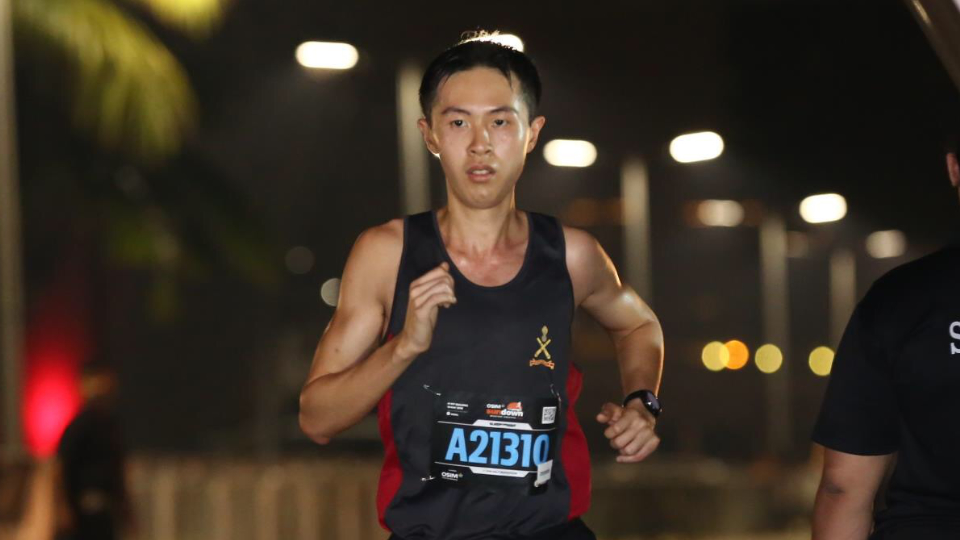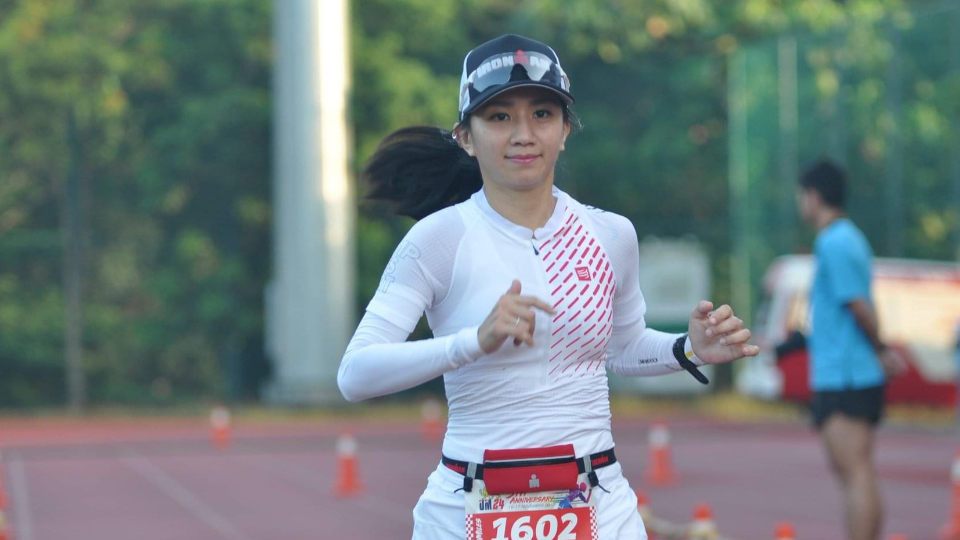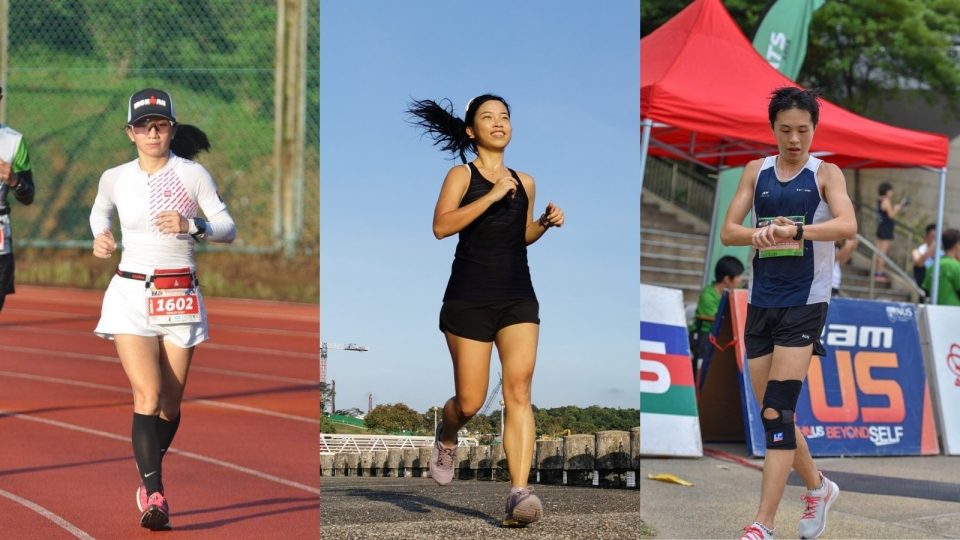Do you know why feeding yourself with a good nutritious snack or meal is important? And especially if you are new to running, it is important to know that fuelling yourselves with nutritious food helps improve endurance, lower the risk of injury, boost the level of performance, and many more.
Thus, we spoke to three elite runners to share their food diet before, during and after running, and how they properly feed themselves with healthy, nutritious meals to boost their running performances.
1. Wong Yik Siong
Bio: Singaporean, 25 year-old, Staff Nurse

Running is Yik Siong’s passion, nursing is his calling, #RuNurse is who he is.
RS: How and when did you start running?
Yik Siong: I started running when I realised I couldn’t do regular sports anymore after having torn my ACL from soccer (twice!) and needed an outlet for physical activity. I’ve never looked back since then.
Five years into running, and I’m already looking forward to where running will take me for the next 50 years. Why running? The bigger question is why not? Don’t knock it till one tries it, you’ll be pleasantly surprised.
RS: How has running changed your food lifestyle?
Yik Siong: Well, to be honest, I ate pretty healthily even before I started running, so I wouldn’t say running changed my eating habits, but I certainly pay more attention to certain nutrient profiles these days
RS: Do you believe that proper nutrition plays a key role in running?
Yik Siong: Of course, without a doubt. Running is a harsh sport, it’s taxing on the muscles and harsh on the bones and joints. No bias here, but recovery matters more in running than many other sports.
In other endurance sports, such as cycling and swimming, they present a much lower impact on the musculoskeletal structure, while for other endeavours, such as gym and weightlifting, athletes often have the option to rotate their training from one muscle group, such as the chest, to another muscle group, such as the back, on a daily basis.
However, running is all about putting one foot in front of the other; whether it’s hard track sessions or easy recovery runs, it’s all on the legs, and it is paramount that we dial in our nutrition so that the legs can recover as fast as possible!
RS: Can you share your food diet with us?
Yik Siong: Contrary to what the popular media often preaches about post workout nutrition, I’m a bigger advocate of focusing on your day to day nutrition instead (unless it’s a heavy session, your body and digestive tract should have enough nutrients flowing through even after workout for recovery).
I will make sure to get tons of fruits and vegetables (stronger emphasis on vegetables) in my diet, as they are high in antioxidants + micronutrients, as well as foods high in omega-3s, such as salmon for their anti-inflammatory properties.
Unless I’m hitting marathon pace or faster work in my long runs, I’ll generally just stick to water. For those harder 20 miler long run-workouts, I’ll make sure I have probably 200 calories worth of intra-run nutrition, be it in the form of gels or drink mix, to make sure I’m not tapped out during the session.
RS: Can you share any advice to beginners on how to fuel up their body well for running?
Yik Siong: Sounds ironic but forget about running. Think macro, think beyond running, think about your health. And lastly, don’t overcomplicate nutrition.
There are many diet fads out there today, especially so for athletes, ranging from the typical high carb low fat diet to the high fat low carb ketogenic trend, which promises to lower inflammation and promotes fat burning to a high protein diet, which is touted to improve muscle recovery.
However, despite the arrays of diet out there, most diets agree that the inclusion of more fruits and vegetables is essential to better health. And that’s something we can all start with and start getting better at doing so.
You can follow Yik Siong on Instagram: @ys_yiksiong
2. Koay Shih Chieh, Ashley
Bio: Malaysian, 36 year-old, Housewife

Ashley completed her first full marathon when her twin babies were only 6 months old in May 2017. She also slowly become an ultra-marathoner. Not just that, but she loves the feeling when she is able to run further and hit her personal best. She is a pacer for a few running events, and she is always there to encourage, motivate and help other runners to achieve their target. She runs with passion and determination.
RS: How and when did you start running?
Ashley: After giving birth to my twins in 2016, I felt anxious, worried, tired and frustrated. I tried running as a form of therapy. Every run improved my mental health and increased my happiness. Soon enough, running helped me overcome my postpartum depression.
RS: How has running changed your food lifestyle?
Ashley: Keep running to stay healthy and eat well. A balanced diet is important to you’re your body healthy and also improve overall performance.
RS: Do you believe that proper nutrition plays a key role in running?
Ashley: Yes. Good quality and healthy food intake will help to maximize training gains.
RS: Can you share your food diet with us?
Ashley: Before running, I choose to intake low glycemic index carbs and drink water to keep hydrated. During my run, I will take in power gel or power bar and sports drink with a good amount of carbs, water or electrolytes. After my run, I will consume high glycemic index carbs, protein and water for hydration.
RS: Can you share any tips to beginners on how to feed their body well for running?
Ashley: Maintaining hydration is important for health and performance. Water regulates body temperature, improves recovery, minimizes injury and cramping, and maximizes performance.
You can follow Ashley on Instagram: @ashleykoay
3. Jerlynn Goh
Bio: Singaporean, 36 year-old, HR

Jerlynn started running back in 2010 when a friend invited her to join a 10km race. They began to keep each other motivated and committed to their training plan and managed to complete the race. Thereafter, they started to run more and longer. Since then, she started joining various running groups for weekly tempo, interval and LSD runs.
To date, she is proud that she has completed eight full marathon races and is now looking forward to toeing the start line of her first World Marathon Major in Berlin when the COVID-19 situation gets better! During the pandemic year, she started to run into the trails as well for a totally new and refreshing experience.
RS: How and when did you start running?
Jerlynn: It was back in 2010 when one of my friends asked me to join her to run for 10km for the Standard Chartered Singapore Marathon race. To achieve the goal, we run regularly and build up the distance slowly.
Thereafter, we started challenging each other to run faster or run longer, increasing the distance from 10km to 21km and finally, a full marathon.
RS: How has running changed your food lifestyle?
Jerlynn: I don’t usually watch my diet because there’s too much good food in Singapore! On days that I have training (usually in the evening), I will make sure I have my proper meals throughout the day to last me for my workout. I will try my best to eat “cleaner” and hydrate better for the weeks leading up to a major race (eg., full marathons).
RS: Do you believe that proper nutrition plays a key role in running?
Jerlynn: Yes. It is by experience that I learnt that proper nutrition and appropriate hydration plays a key role in your performance. I recall one bad experience during a 21km run in my earlier days in running. The weather was very hot, and I unknowingly drank a lot of isotonic drinks to the extent that my body could not take it anymore. I started feeling nauseous and throwing up towards the last few km. It was then I started to pay more attention and plan my nutrition for my races.
In 2019, I challenged myself to my first ironman 70.3 races whereby I also heeded advice from a sports scientist on my nutrition. I felt so good and energized throughout the whole swim, bike and run.
RS: Can you share your food diet with us?
Jerlynn: It really depends on the type of run for that day. If it’s a full marathon, I will usually wake up the body with an energy bar and water minutes before the run.
During the race, I will make sure that I keep my body properly hydrated by rotating between isotonic and plain water. I will plan the intake of energy bar based on certain checkpoints (eg., every 8km) – this also depends on the different recommended consumption for different products.
Surprisingly, I don’t really eat much immediately after the race. I will usually let the body rest, recover and eat when I feel hungry. Of course, I will also reward myself with my favourite sweet dessert!
RS: Can you share any tips to beginners on how to feed their body well for running?
Jerlynn: Everybody reacts differently to the same diet. Hence, you just have to trial and error before you discover what works best for yourself.
I will suggest trying your nutrition plan on a shorter run to see how your body feels before slowly increasing the distance and tweaking your plan accordingly (eg., eating earlier or drinking more).
You can follow Jerlynn on Instagram: @j3rlynn
Planning a diet should not be stressful. If you are new to planning your food diet, take your time and try out which works best for your diet and enjoy your running journey along the way.





